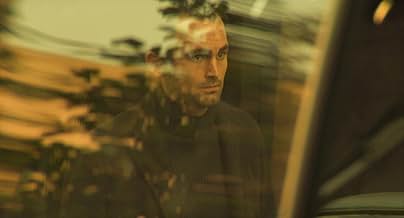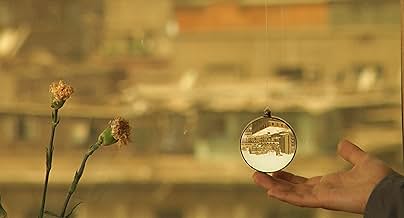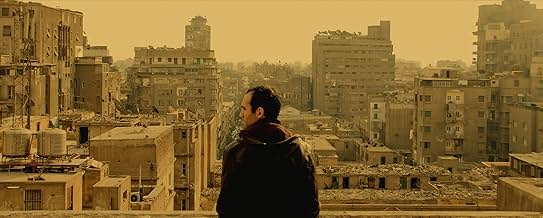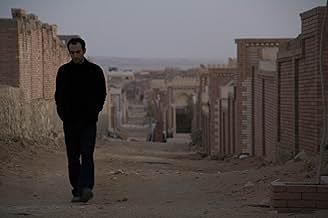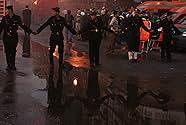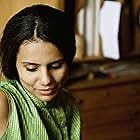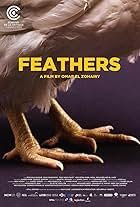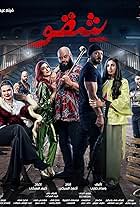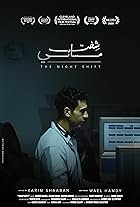IMDb RATING
7.1/10
639
YOUR RATING
A documentary filmmaker in Cairo is having difficulty finishing his film, so his friends send him footage from the cities they live in: Baghdad, Beirut, and Berlin.A documentary filmmaker in Cairo is having difficulty finishing his film, so his friends send him footage from the cities they live in: Baghdad, Beirut, and Berlin.A documentary filmmaker in Cairo is having difficulty finishing his film, so his friends send him footage from the cities they live in: Baghdad, Beirut, and Berlin.
- Awards
- 3 wins & 6 nominations total
Muhammad Adel
- Protestor
- (as Mohamed Adel)
- Director
- Writers
- All cast & crew
- Production, box office & more at IMDbPro
Featured reviews
10Red-125
The Egyptian film Akher ayam el madina (2016) was shown in the U.S. with the title "In the Last Days of the City." It was co-written and directed by Tamer El Said.
The movie starts Khalid Abdalla as Khalid, and Laila Samy as his girlfriend Laila. The real star of the movie is the city of Cairo, where most of the footage was shot. What makes this movie unusual is its construction. It's part a cinematic portrait of Cairo, and part a movie within a movie.
Khalid is the actor who is portraying the director. Khalid's life--and maybe Tamer El Said's life--is going nowhere. He has an on and off relationship with Laila. His mother is hospitalized. Anti-government demonstrations are taking place all over Cairo. He keeps getting more movie footage, but doesn't know how to use the footage to portray the Cairo reality. Of course, the film-within-a-film actually is the movie we watch.
This movie is hard to review, because so much is happening. In reality, so much was, indeed, happening. The footage was shot before the Egyptian Arab Spring, but edited afterwards. So, the director had hindsight about his movie, but he worked with the footage he had taken before the Arab Spring.
The movie is somewhat confusing. Confusing of not, the movie worked for me. It was interesting and some of the footage was fascinating. I don't know much about Cairo, so it's hard for me to tell whether the picture of the city is realistic or not. I'll take director El Said's word that this is the city he saw and presented to us. Another director may have made a totally different film. Who can say?
We saw "In the Last Days of the City" in its Rochester premiere at the wonderful Dryden Theatre in the George Eastman Museum. It will probably work almost as well on the small screen. The movie carries a so-so IMDb rating of 6.9. I think it's much better than that.
The movie starts Khalid Abdalla as Khalid, and Laila Samy as his girlfriend Laila. The real star of the movie is the city of Cairo, where most of the footage was shot. What makes this movie unusual is its construction. It's part a cinematic portrait of Cairo, and part a movie within a movie.
Khalid is the actor who is portraying the director. Khalid's life--and maybe Tamer El Said's life--is going nowhere. He has an on and off relationship with Laila. His mother is hospitalized. Anti-government demonstrations are taking place all over Cairo. He keeps getting more movie footage, but doesn't know how to use the footage to portray the Cairo reality. Of course, the film-within-a-film actually is the movie we watch.
This movie is hard to review, because so much is happening. In reality, so much was, indeed, happening. The footage was shot before the Egyptian Arab Spring, but edited afterwards. So, the director had hindsight about his movie, but he worked with the footage he had taken before the Arab Spring.
The movie is somewhat confusing. Confusing of not, the movie worked for me. It was interesting and some of the footage was fascinating. I don't know much about Cairo, so it's hard for me to tell whether the picture of the city is realistic or not. I'll take director El Said's word that this is the city he saw and presented to us. Another director may have made a totally different film. Who can say?
We saw "In the Last Days of the City" in its Rochester premiere at the wonderful Dryden Theatre in the George Eastman Museum. It will probably work almost as well on the small screen. The movie carries a so-so IMDb rating of 6.9. I think it's much better than that.
IN THE LAST DAYS OF THE CITY directed by Tamer el Said (Egypt) (Nominated in Asia Pacific Screen Award's(APSA) Cultural Diversity Award, under patronage of UNESCO)
There is an experience of immersion while watching this melancholy and poetic film. A young film-maker , 35 year old Khalid, living in Cairo, is struggling with all that is happening in his world, and with finding a way to convey the situation in his beloved city. He collaborates sometimes with several artist friends, who have already left the city. One has gone to Berlin, one to Beirut and another to Baghdad He has an ex-girlfriend, Laila, who is about to leave too. And he is looking for a new apartment, but his real-estate agent is frustrated, because no place is ever suitable. This works as a metaphor for the fact that not only is he not comfortable in his apartment any more, - he is not comfortable in Cairo any more, although it's his beloved home. He wanders in the yellow-tinged world of the decaying and suffering city. The yellow tinge, is from the desert dust that often blows over the city. Tamer el Said says, 'I don't know where the film starts and my life ends. I see the yellow colour in Cairo all the time. This colour goes with a sense of loneliness.' Old Ottoman era houses are being demolished, there is unrest in the streets and everything feels wrong, wrong, wrong. The film is clearly autobiographical, and Tamer reveals his soul via his alter-ego, Khalid. Tamer el Said explained, "The process of making the film is also the process of trying to understand himself, reflecting on many things. My main project is myself, although the film's main "character" is the City. I call Cairo the city that made me who I am. I live in the flat seen in the film, and that is my local neighbourhood. The people in the streets and cafes are my actual neighbours. The filming took place over two years and ended in 2010, only six weeks before the Revolution. I wanted to be part of this change. The editing process was a kind of battle with a beast – 250 hours of footage. Then I worked for a year doing the sound and post production, with collaborators, my amazing crew. Sometimes I spent the whole day editing one scene, then walked in the streets and saw the same people who had been in the footage I'd been editing that day, although four years may have passed. Then I asked myself, 'did something really change? How can we change anything without changing everything?' He continued: 'We grew up, used to experiencing loss and war around us. It shaped our lives and made us different from other people who grew up in Europe, for example. When travelling I realized that I get nervous when I see a police-man, because of my life-experience in Cairo. We cannot carry on like this – things have to change. The situation is no better under our new government, in terms of freedom of expression.' Tamer is disillusioned with the results of the "change he wanted to be part of." He was hoping for freedom and social justice. Tamer el Said graduated in 1998, and has been making short films and documentaries. "In The Last Days of the City" is his first feature film. It has been a slow process and low budget too, because there is no funding for film-making from the government, and there is strict control over freedom of expression in Egypt. However the end result of his labour is one of the most profoundly moving and poetic films I have seen in many years. Better than all the news bulletins and articles we read about what's happening to people in Egypt and other countries in the area around the Middle East, this film expresses the wounds, the disappointment, the eternal hope for a better life for everyone in the surrounding region. It is so tragic to see such ancient lands and cultures, that have had rich cultures and days of glory, now feeling this endless pain. A study of history will show that a lot of this turmoil today, was actually caused by events at the end of the First World War when the victorious Allies sat over maps deciding on how to carve up among themselves, the former lands of the recently collapsed Ottoman Empire, and beyond. Also, by more recent political actions from modern powers too, but that's another story.
There is an experience of immersion while watching this melancholy and poetic film. A young film-maker , 35 year old Khalid, living in Cairo, is struggling with all that is happening in his world, and with finding a way to convey the situation in his beloved city. He collaborates sometimes with several artist friends, who have already left the city. One has gone to Berlin, one to Beirut and another to Baghdad He has an ex-girlfriend, Laila, who is about to leave too. And he is looking for a new apartment, but his real-estate agent is frustrated, because no place is ever suitable. This works as a metaphor for the fact that not only is he not comfortable in his apartment any more, - he is not comfortable in Cairo any more, although it's his beloved home. He wanders in the yellow-tinged world of the decaying and suffering city. The yellow tinge, is from the desert dust that often blows over the city. Tamer el Said says, 'I don't know where the film starts and my life ends. I see the yellow colour in Cairo all the time. This colour goes with a sense of loneliness.' Old Ottoman era houses are being demolished, there is unrest in the streets and everything feels wrong, wrong, wrong. The film is clearly autobiographical, and Tamer reveals his soul via his alter-ego, Khalid. Tamer el Said explained, "The process of making the film is also the process of trying to understand himself, reflecting on many things. My main project is myself, although the film's main "character" is the City. I call Cairo the city that made me who I am. I live in the flat seen in the film, and that is my local neighbourhood. The people in the streets and cafes are my actual neighbours. The filming took place over two years and ended in 2010, only six weeks before the Revolution. I wanted to be part of this change. The editing process was a kind of battle with a beast – 250 hours of footage. Then I worked for a year doing the sound and post production, with collaborators, my amazing crew. Sometimes I spent the whole day editing one scene, then walked in the streets and saw the same people who had been in the footage I'd been editing that day, although four years may have passed. Then I asked myself, 'did something really change? How can we change anything without changing everything?' He continued: 'We grew up, used to experiencing loss and war around us. It shaped our lives and made us different from other people who grew up in Europe, for example. When travelling I realized that I get nervous when I see a police-man, because of my life-experience in Cairo. We cannot carry on like this – things have to change. The situation is no better under our new government, in terms of freedom of expression.' Tamer is disillusioned with the results of the "change he wanted to be part of." He was hoping for freedom and social justice. Tamer el Said graduated in 1998, and has been making short films and documentaries. "In The Last Days of the City" is his first feature film. It has been a slow process and low budget too, because there is no funding for film-making from the government, and there is strict control over freedom of expression in Egypt. However the end result of his labour is one of the most profoundly moving and poetic films I have seen in many years. Better than all the news bulletins and articles we read about what's happening to people in Egypt and other countries in the area around the Middle East, this film expresses the wounds, the disappointment, the eternal hope for a better life for everyone in the surrounding region. It is so tragic to see such ancient lands and cultures, that have had rich cultures and days of glory, now feeling this endless pain. A study of history will show that a lot of this turmoil today, was actually caused by events at the end of the First World War when the victorious Allies sat over maps deciding on how to carve up among themselves, the former lands of the recently collapsed Ottoman Empire, and beyond. Also, by more recent political actions from modern powers too, but that's another story.
But does the self-awareness of an art piece, a film, make up for its imperfections? If it does, does that make the filmmakers lazy? Is it a message or some self-expression? Should it be allowed or even acclaimed? I don't know, and the thing is, I don't even know if it matters or not. But, I'll assume it doesn't matter because life is short and, hey-I'm inspired. For once, I choose not to care. For once, I choose to enjoy the moment, to live in the present and to feel the things I'm supposed to feel. Again, I don't know what's right as a rule or for a fact, but I'll take your advice, I'll open the windows, I'll watch a beautiful city as its millions of parts move, in tandem, for it doesn't lie, for it doesn't self-proclaim what it isn't, for it is real.
I write this as I have the credit scene playing in the background for the third time. Fourth, maybe, I'm not sure. The ambience feels warm, the ending scene is warm, and the whole movie is warm. But, I'm terrified. I'm terrified because I don't know if it is a reflection of the truth or a prediction. Both cases are terrible, and it terrifies me that we're falling into this bottomless pit. Is it even bottomless? Am I supposed to hope for a ladder at the bottom? I don't know, and this is what terrifies me.
I thought... I thought I wanted to be a voice for the voiceless. I always held the thought that Art was a tool and platform for such things, and the Idealist in me has always wished that it is indeed the case, that it is the truth that the power of a voice can grant tangible and not mere sentimentality of a feeling of power or the feeling of possessing the power to cause change even if just a step forward. I don't know if I'm on the winning side. I don't know if I'll ever be.
The contrast we're provided between the different cities is, in a way, scary because it makes me realise that maybe nothing is worth it.
At the time the movie was filmed, maybe what was considered real, what was considered honest and not call itself anything more than what it is, was, in fact, real. But, now, I am confident that it isn't. I'm confident that we can all see beyond the facade that was once an example of truth and it saddens me that we're never moving forward, that we're only falling and there is no bottom in sight.
Let us tell you the tale, of our disaster and ordeal, of the policy of our state.
Oh, our country! Looted, R*ped by ***** and his gangs. Ruled by the m*******, who plundered your wealth.
Freedom to all the prisoners, Freedom to ***** \.
Every time they kidnap one of us, the voice of truth only gets louder.
M******* m******* m*******, why!?
Are we at war or what???
*******, the agent, sold the *** to I*****. Down with *****. Down with the m rule.
Tomorrow the E******* people will bring the regime down.
Freedom to the prisoners.
You could replace each of those censored words with many names, with many entities and will still tell the full truth.
Beautiful on the outside, rotten on the inside. A part of me wished I could say I'm afraid to look inside to see the rot, but the truth is, it looks like I've always been on the inside haven't I?
When is it safe to say that nothing is worth saving, that it's okay, that it's ideal to run away and never look back?
I'm in awe because this tells the truth, and transparently transponds the conundrum as is, no filter. It doesn't lie to us. It doesn't give us hope. It gives us a voice which is A LOT.
The cinematography is beautiful. The editing is brilliant and the acting is on point. This was hard to find in order to watch, but it was worth it in every way and maybe that just gave it further value. Maybe, that's what art is, an experience... right? The dialogue was well-written, providing a loud voice for those who suffer, and the silence was even louder.
No, it doesn't have a 3 act structure. It probably doesn't have an orthodox structure whatsoever but it's real and it gets to break the rules. I kept on going back to older scenes while writing this review and I kept on realising I didn't even see the full extent of its beauty.
It's just real.
God save Gaza, Beirut, Khartoum, Baghdad, Damascus, Sanaa, Tripoli, and Cairo.
Signing out, a pessimistic idealist, a coward who keeps pushing forward.
I write this as I have the credit scene playing in the background for the third time. Fourth, maybe, I'm not sure. The ambience feels warm, the ending scene is warm, and the whole movie is warm. But, I'm terrified. I'm terrified because I don't know if it is a reflection of the truth or a prediction. Both cases are terrible, and it terrifies me that we're falling into this bottomless pit. Is it even bottomless? Am I supposed to hope for a ladder at the bottom? I don't know, and this is what terrifies me.
I thought... I thought I wanted to be a voice for the voiceless. I always held the thought that Art was a tool and platform for such things, and the Idealist in me has always wished that it is indeed the case, that it is the truth that the power of a voice can grant tangible and not mere sentimentality of a feeling of power or the feeling of possessing the power to cause change even if just a step forward. I don't know if I'm on the winning side. I don't know if I'll ever be.
The contrast we're provided between the different cities is, in a way, scary because it makes me realise that maybe nothing is worth it.
At the time the movie was filmed, maybe what was considered real, what was considered honest and not call itself anything more than what it is, was, in fact, real. But, now, I am confident that it isn't. I'm confident that we can all see beyond the facade that was once an example of truth and it saddens me that we're never moving forward, that we're only falling and there is no bottom in sight.
Let us tell you the tale, of our disaster and ordeal, of the policy of our state.
Oh, our country! Looted, R*ped by ***** and his gangs. Ruled by the m*******, who plundered your wealth.
Freedom to all the prisoners, Freedom to ***** \.
Every time they kidnap one of us, the voice of truth only gets louder.
M******* m******* m*******, why!?
Are we at war or what???
*******, the agent, sold the *** to I*****. Down with *****. Down with the m rule.
Tomorrow the E******* people will bring the regime down.
Freedom to the prisoners.
You could replace each of those censored words with many names, with many entities and will still tell the full truth.
Beautiful on the outside, rotten on the inside. A part of me wished I could say I'm afraid to look inside to see the rot, but the truth is, it looks like I've always been on the inside haven't I?
When is it safe to say that nothing is worth saving, that it's okay, that it's ideal to run away and never look back?
I'm in awe because this tells the truth, and transparently transponds the conundrum as is, no filter. It doesn't lie to us. It doesn't give us hope. It gives us a voice which is A LOT.
The cinematography is beautiful. The editing is brilliant and the acting is on point. This was hard to find in order to watch, but it was worth it in every way and maybe that just gave it further value. Maybe, that's what art is, an experience... right? The dialogue was well-written, providing a loud voice for those who suffer, and the silence was even louder.
No, it doesn't have a 3 act structure. It probably doesn't have an orthodox structure whatsoever but it's real and it gets to break the rules. I kept on going back to older scenes while writing this review and I kept on realising I didn't even see the full extent of its beauty.
It's just real.
God save Gaza, Beirut, Khartoum, Baghdad, Damascus, Sanaa, Tripoli, and Cairo.
Signing out, a pessimistic idealist, a coward who keeps pushing forward.
Storyline
Did you know
- TriviaShooting began with less than 15% of the budget in place.
Details
- Release date
- Countries of origin
- Official sites
- Language
- Also known as
- El los últimos días de la ciudad
- Filming locations
- Production companies
- See more company credits at IMDbPro
- Runtime1 hour 58 minutes
- Color
- Aspect ratio
- 1.85 : 1
Contribute to this page
Suggest an edit or add missing content

Top Gap
By what name was In the Last Days of the City (2016) officially released in Canada in English?
Answer


